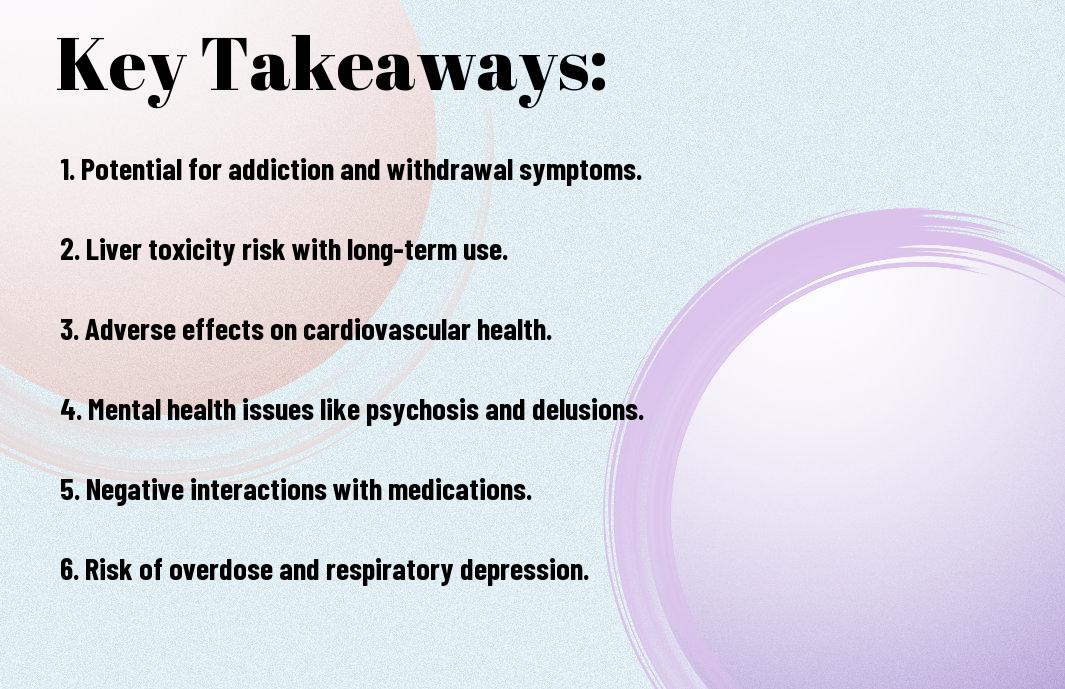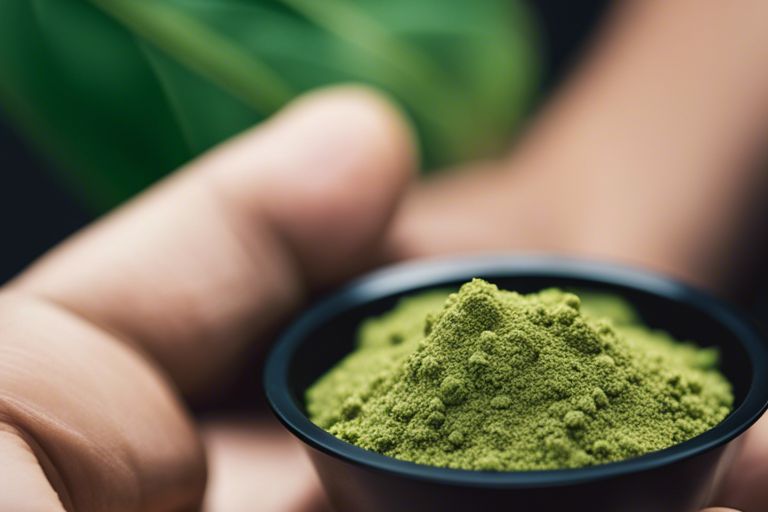Many individuals are unaware of the dangerous repercussions of consuming kratom. Despite its popularity, this herbal supplement can have serious side effects on one’s health and well-being. From addiction and dependency to liver damage and even death, the negative impact of kratom should not be underestimated. To learn more about the uses and side effects of this substance, visit What is Kratom? Uses and Side Effects.
Key Takeaways:
- Physical Dependence: Kratom can lead to physical dependence, causing withdrawal symptoms similar to opioids when use is stopped abruptly.
- Respiratory Depression: High doses of kratom can lead to respiratory depression, a serious side effect that can be life-threatening.
- Psychological Effects: Kratom may cause mood swings, irritability, and anxiety, especially in individuals with a history of mental health disorders.

The Dark Side of Kratom
Increased Risk of Addiction
The Kratom: What Are The Health Benefits vs. Risks? article sheds light on the dark reality of kratom. One of the concerning aspects of kratom is its potential to lead to addiction. Kratom contains compounds that can interact with opioid receptors in the brain, leading to a euphoric effect. This can make individuals vulnerable to developing a dependence on it, similar to opioids.
Withdrawal Symptoms
An ominous consequence of frequent kratom use is the onset of withdrawal symptoms when trying to quit. These symptoms can range from mild to severe and may include anxiety, irritability, insomnia, muscle aches, and more. For instance, individuals who have been consuming kratom regularly may experience intense cravings and mood swings, making it challenging to break free from its grip.
Physical Consequences
Nausea and Vomiting
With the consumption of kratom, users may experience unpleasant side effects such as nausea and vomiting. These symptoms can be particularly intense for individuals who take high doses of kratom or who are sensitive to its effects. Nausea and vomiting can lead to dehydration and electrolyte imbalances, which can be harmful to overall health.
Dizziness and Drowsiness
Any use of kratom runs the risk of causing dizziness and drowsiness. These side effects can impair a person’s ability to function normally, leading to accidents or injuries. It is crucial to avoid activities that require alertness, such as driving or operating machinery, while under the influence of kratom.
Another concerning aspect of dizziness and drowsiness caused by kratom is the potential for dependency. Users may start relying on kratom to combat fatigue or stress, leading to a cycle of dependence that can be difficult to break.
Weight Loss and Insomnia
The use of kratom has been associated with weight loss and insomnia. These physical consequences can have a significant impact on an individual’s overall well-being. Weight loss may occur due to decreased appetite caused by kratom use, while insomnia can disrupt sleep patterns and lead to fatigue and other health issues.
The combination of weight loss and insomnia can create a vicious cycle, where individuals may turn to kratom for energy during the day and then struggle to sleep at night, perpetuating the cycle of negative effects on the body.
Dizziness, drowsiness, weight loss, and insomnia are just a few of the physical consequences that can result from kratom use. It’s important for individuals considering using kratom to be aware of these potential side effects and to prioritize their health and well-being.
Mental Health Concerns
Now, let’s explore some of the mental health concerns associated with kratom use.
Anxiety and Depression
Concerns: Kratom has been reported to exacerbate anxiety and lead to feelings of depression in some individuals. While some users claim that kratom helps alleviate these conditions, prolonged and excessive use can have the opposite effect. The stimulating effects of kratom may increase heart rate and agitation, leading to heightened anxiety levels. Additionally, the euphoric effects of kratom can mask underlying feelings of depression, potentially making the condition worse in the long run.
Hallucinations and Psychosis
On rare occasions, kratom use has been linked to hallucinations and psychosis. These severe mental health issues can be alarming and dangerous. Hallucinations involve seeing, hearing, or feeling things that are not real, while psychosis is a severe mental disorder where the individual loses touch with reality. These effects are more likely to occur with high doses of kratom or when mixed with other substances.
Anxiety
Suicidal Thoughts and Behaviors: Some individuals who use kratom may experience an increase in suicidal thoughts and behaviors. This is a serious concern and should not be taken lightly. While the exact mechanisms behind this association are not fully understood, it is crucial for individuals struggling with these thoughts to seek professional help immediately. The combination of kratom-induced mood changes and other underlying mental health issues may contribute to these harmful behaviors.
Psychosis
Although rare, it is crucial to highlight the potential for kratom use to trigger suicidal thoughts and behaviors. Individuals with a history of mental health disorders or suicidal ideation should avoid kratom due to these risks. It is imperative to prioritize mental health and seek help if experiencing any negative effects while using kratom.
Interactions with Medications
All individuals considering using kratom should be aware of the potential interactions it can have with various medications. These interactions could lead to serious health complications or diminish the effectiveness of certain drugs. It is crucial to consult with a healthcare provider before using kratom, especially if you are taking any prescription medications.
Blood Thinners and Anticoagulants
One concern with kratom use is its potential interaction with blood thinners or anticoagulants. Kratom has been reported to have anticoagulant properties, which could increase the risk of bleeding when combined with medications like warfarin or aspirin. This interaction could lead to severe bleeding episodes or other complications, making it imperative to discuss kratom use with a healthcare provider if you are taking blood thinners.
Opioids and Painkillers
With the opioid epidemic gripping many parts of the world, the interaction between kratom and opioids or painkillers is of particular concern. Kratom interacts with the same receptors as opioids, leading to the potential for synergistic effects or overdose when used together. This can increase the risk of respiratory depression, coma, or even death. It is crucial to avoid combining kratom with opioids or painkillers to prevent these dangerous outcomes.
Blood thinners and anticoagulants, opioids and painkillers, and antidepressants and mood stabilizers are just a few examples of medications that can interact with kratom. It is imperative to be cautious and informed about these potential interactions to avoid any adverse effects. If you are currently taking medications, consult with a healthcare provider before using kratom to ensure your safety and well-being.
Antidepressants and Mood Stabilizers
Any interaction between kratom and antidepressants or mood stabilizers could have severe consequences for individuals. Kratom may enhance the effects of these medications, leading to excessive sedation, respiratory depression, or serotonin syndrome. This dangerous combination could be life-threatening and should be avoided at all costs.
For instance, combining kratom with selective serotonin reuptake inhibitors (SSRIs) or monoamine oxidase inhibitors (MAOIs) can result in serotonin syndrome, a potentially fatal condition characterized by agitation, hallucinations, rapid heartbeat, and fluctuations in blood pressure. It is crucial to avoid combining kratom with antidepressants and mood stabilizers to prevent these dangerous interactions.

Social and Economic Impacts
Strained Relationships and Isolation
Relationships that were once strong and thriving may suffer as kratom use takes its toll. The altered behavior and mood swings that come with kratom addiction can strain relationships with family, friends, and colleagues. Moreover, individuals struggling with kratom addiction may isolate themselves to hide their dependency, leading to further deterioration of social connections.
Financial Burden and Debt
Social consequences of kratom addiction can extend to financial struggles, with individuals spending significant amounts of money to fuel their habit. This can lead to a cycle of debt, jeopardizing financial stability and causing long-term economic hardship. Financing an addiction only adds to the burden of recovery and can create lasting consequences for individuals and their families.
It is crucial to address the financial aspect of kratom addiction as part of a comprehensive recovery plan. Seeking professional help and support to manage financial burdens is important in breaking free from the cycle of debt and ensuring a successful recovery journey.
Decreased Productivity and Performance
To maintain a job and perform effectively becomes increasingly challenging for individuals battling kratom addiction. The decreased productivity and poor job performance can result in job loss, missed opportunities, and damaged reputations. This not only affects the individual but also has ripple effects on the broader economy and the community as a whole.
Burden of decreased productivity due to kratom addiction can have lasting effects on one’s career and professional growth. Seeking help and support to overcome addiction is crucial in regaining control over one’s performance and striving for success in both personal and professional endeavors.
Can Kratom Use Lead to Negative Effects Such as Hair Loss?
Yes, kratom’s potential hair effects have raised concerns among users. Some have reported experiencing hair loss after prolonged use of the substance. While more research is needed to understand the link between kratom and hair loss, it’s important for users to be aware of the potential negative effects associated with its use.
Unregulated Industry and Lack of Oversight
Despite its growing popularity, the kratom industry remains largely unregulated, leading to a host of issues that pose significant risks to consumers. The lack of oversight means that manufacturers and sellers are not held to rigorous standards, opening the door to various problems that can have serious consequences.
Contaminated Products and Adulterants
An alarming issue stemming from the unregulated nature of the industry is the presence of contaminated kratom products and adulterants. Consumers may unwittingly be exposed to toxic substances such as heavy metals, pesticides, or even dangerous prescription medications that are added to kratom products without proper disclosure.
False Advertising and Misleading Claims
Oversight of kratom products is crucial to prevent false advertising and misleading claims that can deceive consumers about the efficacy and safety of these products. Without proper regulations in place, unscrupulous vendors may make unsupported statements about the benefits of kratom or downplay potential risks, putting consumers at risk of harm.
Another concerning aspect of the lack of oversight in the kratom industry is the proliferation of misinformation and unsubstantiated claims. Some vendors may engage in misleading marketing tactics that exaggerate the benefits of kratom or fail to provide accurate information about its potential side effects, leading consumers to make uninformed decisions about its use.
Unqualified Vendors and Sellers
Advertising and selling kratom without proper qualifications or expertise can have serious consequences for consumers. Unqualified vendors may not have the knowledge or training to ensure the safety and quality of their products, increasing the risk of contaminated or adulterated kratom reaching consumers.
Plus, consumers may be misled about proper kratom dosage and usage guidelines, putting them at risk of overdose or other adverse effects. It is imperative for the industry to implement stricter regulations and oversight to protect consumers from these potential dangers.
Conclusion
So, it is evident that kratom can have negative effects on individuals who consume it. From potential addiction and withdrawal symptoms to liver damage and respiratory issues, the risks associated with kratom use are serious and should not be overlooked. It is important for individuals considering using kratom to be well-informed about these potential dangers and to approach its use with caution.
Overall, the negative effects of kratom serve as a reminder of the importance of being aware of the potential risks and consequences of consuming substances with psychoactive properties. Just like with any other substance, moderation and education are key when it comes to mitigating the harm that kratom can cause. By understanding and respecting the potential dangers associated with kratom, individuals can make more informed decisions about their health and well-being.
FAQ
Q: What are the negative effects of kratom?
A: The negative effects of kratom can include nausea, constipation, dizziness, and addiction.
Q: Is kratom dangerous to consume?
A: Yes, kratom can be dangerous to consume, especially in large doses or when mixed with other substances.
Q: Can kratom cause addiction?
A: Kratom has addictive properties and can lead to dependence with regular use.
Q: Are there any long-term effects of using kratom?
A: Long-term use of kratom can result in liver damage, psychosis, and other serious health issues.
Q: Is it legal to use kratom?
A: The legality of kratom varies by country, with some places banning its use due to safety concerns and potential for abuse.








